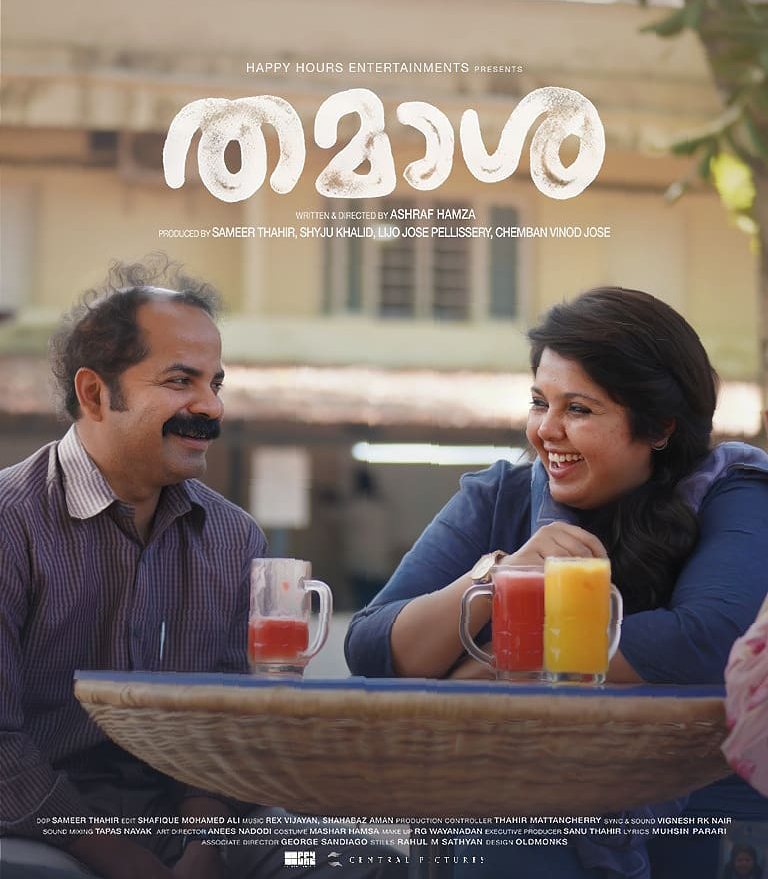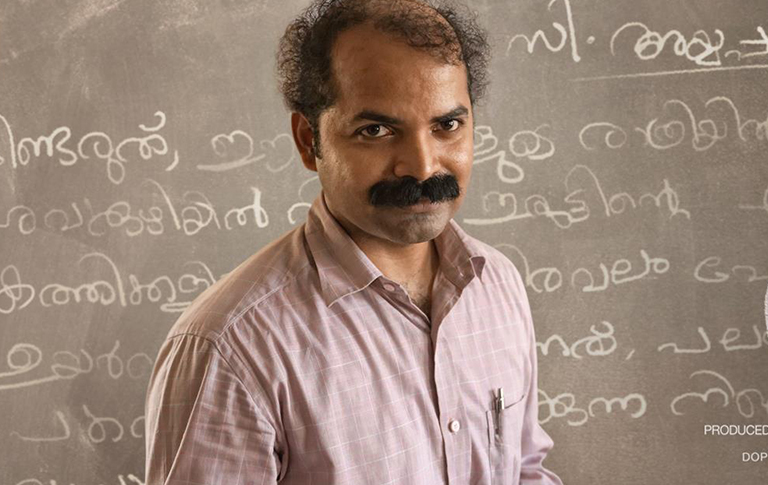When Professor Sreenivasan drags a student to the principal’s office for playing a prank in class, the principal reprimands the junior for being disrespectful towards someone “old enough to be his father.” Sreenivasan, who is balding with a few fragments of curls on his forehead, digests this information, takes a deep breath, turns to the senior and says— “Sir, 30. I will turn 31 this year.” Thamasha, directed by debutante Ashraf Hamza, has a balding hero, who is dying to get married, but finds himself being rejected as he doesn’t subscribe to the societal standards of beauty. He is being paired with a heroine, who, also falls short in the beauty meter—she is large and is already tired of being ridiculed for it.
Sreenivasan isn’t someone we aren’t familiar with. He has been a favourite pin-up boy of writer-director Sreenivasan’s films, where all the jokes are on him. In fact, the name doesn’t look like too much of a coincidence, there is a deliberate meta humour in it.
Sreenivasan has no sense of self-worth, and over the years he has conditioned himself to believe that he should be judged on the merits of his looks alone. And to be fair to him, the world around him is isn’t keen on ignoring it either. So, the balding patch on his head is a constant reminder, which makes him unsure, conscious and he fumbles a lot. The narrative is too focussed on his journey of finding a girl in his life, and the eagerness he shows when he spots a pretty girl often evokes a sense of pity and desperation. His coming-of-age arc therefore seems too one-dimensional.
Read More
- Movie Review : ‘English Vinglish’
- Did Thalapathy Vijay shine in Lokesh Kanagaraj’s LEO?
- Mall of Muscat solidifies its position as the country’s leading fun and entertainment destination by launching Fun VR
- Three-time Oscar nominee Piper Laurie dies at 91
- TAS Weekly: The fascinating rise of Omani singer Jihad Al Raisi
Having said that the writing is pretty good in the initial portions. There is a hilarious segment where he pens a love letter with mind-boggling poetry (a sly troll about the language professor’s obsession with words and their general sense of superiority) and Rahim (brilliantly played by Navas Vallikkunnu who reminds you of a young Mammukoya) kindly offers to write it in simple Malayalam. Food plays cupid and it’s interestingly woven—be it the Pulao, kayapolas and Biryanis he offers Babita Teacher (a character that required better detailing and closure), the Masala Chai he shares with Safiya (Grace Antony) and the cakes with Chinnu.

I am not very sure whether it’s good or bad that one hardly feels sympathetic towards Sreenivasan. He is unhappy, unpleasant and we aren’t sure even with a mop of hair why anyone should take a liking for him. When he meets Chinnu for the first time, he too falls prey to the societal lens of judging a person by their physicality. “I can only see a fat girl here,” he tells her over the phone. And he is sure for all his limitations, he would rather marry the “perfect girl.” That constant worry about how society perceives him is what defines his life. Sreenivasan is unaware that he is as much a part of that hypocritical society and as much a hypocrite as the rest of them.
So perhaps it’s easier to empathise with Chinnu who, in sharp contrast to Sreenivasan carries an admirable sense of self-worth. It’s there in that scene where she laughs about her break-up story with him. But what exactly is the empowering message the makers are trying to convey? That a confident, happy, independent woman like Chinnu (Chinnu Chandni Nair is superb here) should end up with someone so obnoxious and ordinary like Sreenivasan, simply because she is on the heavier side? Or that one can find meaning and happiness in life only if he/she gets married?
Though Safiya’s track begins nicely, soon it drifts into a predictable narrative.
Vinay Fort looks the part but has something going against him. Sreenivasan at times gives the impression of being an extension of his Vimal Sir (Premam). Probably because they share a few character traits and Fort is unable to delineate one from the other. The love story that is the most heart-warming is that of Rahim and his wife, and the unexpected twist to it is even more.
It’s also a film where sub characters are beautifully cast and roles well-written. Be it the mother, brother, father, the principal (who is hilarious) or the sisters—they lend a novelty and humour to the narrative.
The writing (and the film) falters towards the end. Not only is it the usual commentary on social media, its nasty jibes and how it has become a free-for-all in today’s world, but a lot of things are unconvincing. How, for instance can a harmless selfie between a plus size woman and a balding man (more so as the photo never gives away their flaws) create so much uproar on the social media, unless of course they were in a compromising position?
Thamasha does address a lot of issues and it’s not that they haven’t been addressed before and some of it are very predictable. What isn’t predictable is a heroine like Chinnu who is real and unapologetic for who she is. But does she get a closure she deserves remains the bigger question here.







